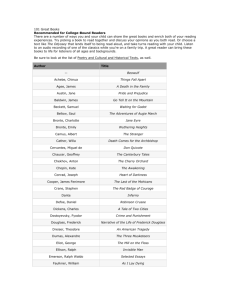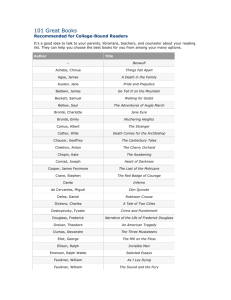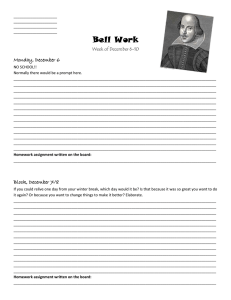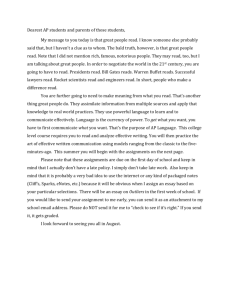Proceedings of 3rd Asia-Pacific Business Research Conference
advertisement
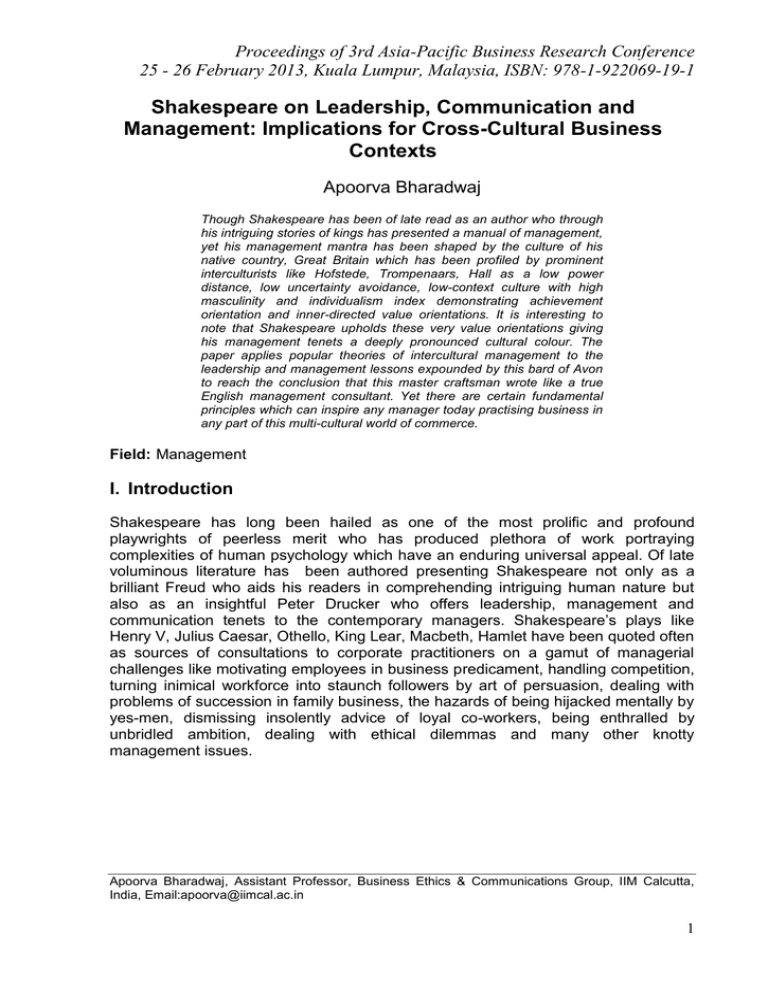
Proceedings of 3rd Asia-Pacific Business Research Conference 25 - 26 February 2013, Kuala Lumpur, Malaysia, ISBN: 978-1-922069-19-1 Shakespeare on Leadership, Communication and Management: Implications for Cross-Cultural Business Contexts Apoorva Bharadwaj Though Shakespeare has been of late read as an author who through his intriguing stories of kings has presented a manual of management, yet his management mantra has been shaped by the culture of his native country, Great Britain which has been profiled by prominent interculturists like Hofstede, Trompenaars, Hall as a low power distance, low uncertainty avoidance, low-context culture with high masculinity and individualism index demonstrating achievement orientation and inner-directed value orientations. It is interesting to note that Shakespeare upholds these very value orientations giving his management tenets a deeply pronounced cultural colour. The paper applies popular theories of intercultural management to the leadership and management lessons expounded by this bard of Avon to reach the conclusion that this master craftsman wrote like a true English management consultant. Yet there are certain fundamental principles which can inspire any manager today practising business in any part of this multi-cultural world of commerce. Field: Management I. Introduction Shakespeare has long been hailed as one of the most prolific and profound playwrights of peerless merit who has produced plethora of work portraying complexities of human psychology which have an enduring universal appeal. Of late voluminous literature has been authored presenting Shakespeare not only as a brilliant Freud who aids his readers in comprehending intriguing human nature but also as an insightful Peter Drucker who offers leadership, management and communication tenets to the contemporary managers. Shakespeare‟s plays like Henry V, Julius Caesar, Othello, King Lear, Macbeth, Hamlet have been quoted often as sources of consultations to corporate practitioners on a gamut of managerial challenges like motivating employees in business predicament, handling competition, turning inimical workforce into staunch followers by art of persuasion, dealing with problems of succession in family business, the hazards of being hijacked mentally by yes-men, dismissing insolently advice of loyal co-workers, being enthralled by unbridled ambition, dealing with ethical dilemmas and many other knotty management issues. Apoorva Bharadwaj, Assistant Professor, Business Ethics & Communications Group, IIM Calcutta, India, Email:apoorva@iimcal.ac.in 1 Proceedings of 3rd Asia-Pacific Business Research Conference 25 - 26 February 2013, Kuala Lumpur, Malaysia, ISBN: 978-1-922069-19-1 Though most of these words of wisdom are universal and hence are not circumscribed by limitations of cultural heterogeneity, yet it is interesting to probe them through the filter glasses of various cultural dimensions. Since business has now mostly become cross-cultural in its operations, it is interesting to apply the various cultural theories to Shakespeare‟s managerial offerings. This paper aims at scrutinizing whether the managerial exhortations presented by this bard of Avon can be applied to diverse cultural contexts or they are predominately Anglican like the theories of leadership, motivation and management propounded by Occidental thinkers, which came under scanner recently for their application limitations owing to cultural variations in the business world. II. Literature Review Books such as Power Plays by John O. Whitney and Tina Packer (Simon & Schuster, 2000), Bardisms: Shakespeare for All Occasions (Collins, a division of HarperCollins publishers, 2009) are some of the works presenting Shakespeare as a management consultant par excellence. Works like these trace through the mellifluous verses of this Globe theatre, director and actor various nuggets of sagacity which corporate heads can use to steer their wobbling careers in today‟s turbulent financial times. Shakespeare has been presented by many authors as a genius who can offers his own canon of principles and practices of leadership and motivation. However, it was Geert Hofstede pointed out at culture as an important variable in the application of leadership styles and motivation technique (Hofstede, 1980). Hofstede dubbed the popular theories of motivation like Maslow‟s hierarchy of needs, Herzeberg‟s two-factor theory, McGregor‟s theory X and theory Y, etc. as American in relevance. Since then many theories which are culture-specific have been proposed and propounded like Management and Cultural Values – The Indigenization of Organizations in Asia (Kao,Henry S.R., Sinha, Wilpert eds, 1999), Theory Z: How American Business Can Meet the Japanese Challenge by Prof. William Ouchi (Ouchi, 1981), Performance Maintenance Leadership by a Japanese scholar, Prof. J. Misumi, Cranfield University study for leadership styles in Europe (Ray, 2007), the paternal model of leadership style practised in Southeast Asia by Robert Westwood. Though we have numerous such culture specific studies, but GLOBE (Global Leadership and Organizational Behaviour Effectiveness) project is the only study in the world that has analyzed leadership practitioners in the context of cultures all over the world (Northouse, 2006). Thus when the management principles and practices espoused in different parts of the world defy reduction to the homogeneity of one particular model, the applicability of Shakespearean stratagems may also have a limited localized impact, i.e. they conform to the Anglican principles and practices of leadership and management. Hence the scholar here attempts to present some of the most popular management interpretations of this dramaturgist‟s scripts in the light of the cultural dimensions of Hofstede, Trompenaars, Hall and the GLOBE study with a view to ratify or repudiate their universal relevance in today‟s multi-cultural managerial environment. Let us review the cultural studies done by Hofstede, Trompenaars and along with the findings of the GLOBE project. 2 Proceedings of 3rd Asia-Pacific Business Research Conference 25 - 26 February 2013, Kuala Lumpur, Malaysia, ISBN: 978-1-922069-19-1 1. Hofstede’s study Hofstede delineates the following dimensions of national culture: Power distance Individualism Masculinity and femininity Uncertainty avoidance Long-term Orientation Great Britain, Shakespeare‟s country of origin, ranks in top ten on the parameters of low power distance, high individualism, high masculinity, and low uncertainty avoidance. TABLE 1 – HOFSTEDE’S CULTURAL DIMENSIONS AND GREAT BRITIAN (Hofstede, 2003) Hofstede’s Dimension Low Power Distance Individualism Masculinity Lowest Uncertainty Avoidance Rank 10/11 (bottom 10) 3 (top 10) 9/10 (top 10) 6/7 (top 10) Score 35 89 66 35 This is what Hofstede has to say regarding motivation and leadership for culture of this profile. TABLE 2 – HOFSTEDE’S DIMENSIONS AND MOTIVATION (Hofstede, 2003) Dimension Individualism Masculinity Uncertainty Avoidance Effect on Motivation In highly individualistic countries, people are motivated by opportunities for individual advancement and autonomy. Money is an important motivator. People with weak uncertainty avoidance are motivated by risky opportunities. 3 Proceedings of 3rd Asia-Pacific Business Research Conference 25 - 26 February 2013, Kuala Lumpur, Malaysia, ISBN: 978-1-922069-19-1 TABLE 3 – HOFSTEDE’S DIMENSIONS AND LEADERSHIP (Punnet, 2004) Low Power Distance Individualistic Cultures Masculine cultures Weak uncertainty avoidance culture Prefer a participative and consultative leadership style Leaders cannot expect loyalty from subordinates; leaders need to demonstrate competence Individual achievement and autonomy are valued Leaders focus on achieving difficult performance goals High achievers are given tangible rewards Independence is respected Leaders who offer their subordinates flexibility in finding solutions are appreciated. The leadership traits Hofstede assigns to these parameters are very well reflected in the Shakespearean leaders as discussed from time to time below. 2. GLOBE Country Clusters In the GLOBE study Great Britain figures in the Anglo cluster to which the leadership traits attributed are mentioned below. TABLE 4 – GLOBE COUNTRY CLUSTER AND PREFERRED LEADERSHIP STYLE (Northouse, 2006) Anglo Cluster US, England, Australia, Canada, New Zealand, Ireland, White South Africa Preferred leadership Charismatic/value-based, participative, and sensitive to style in Anglo cluster people, motivating and visionary, not autocratic, and considerate of others Some of Trompenaars‟ cultural ramifications relevant here are achievement- oriented vs ascription-oriented and inner-directed vs outer-directed countries. In achievement-oriented cultures people are judged on the basis of their work, while in ascription cultures one is valued for what one is, on the bases of family background, gender, age. 4 Proceedings of 3rd Asia-Pacific Business Research Conference 25 - 26 February 2013, Kuala Lumpur, Malaysia, ISBN: 978-1-922069-19-1 TABLE 5 - TROMPENAARS’ DIMENSIONS AND UK (Trompenaars, 1993 Achievement- oriented countries Ascription-oriented countries Inner-directed countries Outer-directed countries Australia, Denmark, Canada, the US, UK, Sweden, Germany, France Italy, Spain, Japan, China, India, Indonesia, Oman, Brazil The US, Switzerland, Canada, Germany, Argentina, Australia, Spain, France, UK China, Egypt, Japan, Turkey, UAE, Nigeria, Poland, India UK is achievement oriented culture hence the Shakespearean kings who indulge and revel in their power believing that their titular position is enough to grant them absolute supremacy fail, while heroes who do not take power for granted and believe in proving their leadership mettle through their competence succeed. Trompenaars‟ inner-directed cultures are ones with internal locus of control and UK qualifies in this category. Shakespeare seems to be following Trompenaars when again and again he reiterates that man is architect of his own destiny. It is the fatal flaw in Shakespearean kings that propel them to doom rather than circumstantial destiny. The author proposes that the leadership models Shakespeare presents are in congruence with the cultural dimensions of his native country, Great Britain. Particularly, Shakespeare‟s Henry V is perfectly modelled on these value orientations. III. Methodology The paper outlines the various cultural dimensions as expounded by Hofstede, Trompenaars, GLOBE study, which represent some of the seminal works done across the globe in intercultural management and culls popular quotations and examples from the bard and tries to interpret their semantics in the light of these cultural studies. While discussing sundry cultural value orientations, the author primarily bases her analysis on Hofstede‟s culture model, the Trompenaars‟ cultural dimensions and the GLOBE country clusters. Edward T. Hall‟s concept of low-context vs. high-context is also used to demonstrate the impact of cultural values on communication style (Hall, 1999). The paper is organized on the basis of various cultural dimensions of England that find resonance in Shakespeare‟s works and hence in turn shape his leadership, communication and management tenets. 5 Proceedings of 3rd Asia-Pacific Business Research Conference 25 - 26 February 2013, Kuala Lumpur, Malaysia, ISBN: 978-1-922069-19-1 IV. Discussion 1. Shakespeare’s Biographical Sketch Before discussing various cultural dimensions to test the universality of Shakespeare‟s management principles, here is a brief review of Shakespeare‟s life. Though Shakespeare is venerated world over as an artist of enormous talent, yet it is interesting to see that he was not a archetypal artist living in his ivory tower, living and languishing in penury, but an opulent businessman who knew how to manage people, market his talent, network with those in power, run his Globe theatre as a profit-churning enterprise. His father was also a businessman and hence he was equipped with both, experience and merit of a successful entrepreneur who perhaps stands as some of the very few towering literary figures marrying „bardism‟ to business. Hence he is fully qualified to act as a management thinker and guide to those braving the vicissitudes of their precarious business careers. 2. Link with Modern Management Managing organizations was a challenge in the era of Shakespeare too. In those days kings, queens, dukes, lords were the leaders who either led their subordinates (in this case subjects) successfully or failed miserably in discharging their leadership functions. It is noteworthy that most of the Shakespeare's plays are stories about leadership rather than romantic love. His stories recount the rise and fall of their protagonists who advise, admonish and answer many quandaries besetting contemporary business leaders. Many corporate leaders have found sustenance in the dramas of this bard of Avon. 3. Shakespeare’s Henry V and the English Culture In lieu of explicating abstract notions of authority, Shakespeare presented his leadership concepts through his protagonists. He depicts leaders with whom readers can identify easily. In his plays leaders who believe that their title entitles them to unbridled power and hence unquestioning compliance from their followers precipitate their own debacle as their modern counterparts - senior managers manning organizations, who believe that their designation gives them autonomy to act independently. For example, Richard II opines that his title vests in him the power to expect unflinching compliance from his subjects. King Lear has a delusion that he continues to be in power despite giving away foolishly the land from which he derives his power. Antony believed that power doesn‟t come from Rome (the state that bestowed power on him) but is enshrined in him and can be used as he wished. All these characters who seem to repose their credence in ascription-oriented system that values one on the basis of what one is instead of what one does meet an ignominious debacle. Shakespeare opines that leaders are not born but are made – a leader has to prove his competence rather than use coercion to steer his followers 6 Proceedings of 3rd Asia-Pacific Business Research Conference 25 - 26 February 2013, Kuala Lumpur, Malaysia, ISBN: 978-1-922069-19-1 in his favour. That is why we find Henry V trying to motivate his soldiers by infusing in them zest to encounter risky challenges and lures them by offering them rewards instead of using power to quell the dissenting voices. When Henry V declares… “But I will rise there with so full a glory That I will dazzle all the eyes of France…” King Henry V (Act I, Scene 2) He seems to portray the leadership style of a high masculine culture, i.e., the culture of Great Britain. (Refer to table no. 3) When he says, “…No, my fair cousin: If we are marked to die, we are enough To do our country loss, and if to live, The fewer men, the greater share of honour.” King Henry V ( Act IV, Scene 3) He demonstrates how personal rewards (tangible or intangible motivate people in individualistic, masculine cultures (Refer to table no. 2) He further fortifies our notion of culture-centric motivation when he says… “But if it be a sin to covet honour I am the most offending soul alive. No, faith, my coz, wish not a man from England. God‟s peace, I would not lose so great an honour As one man more, methinks, would share from me For the best hope I have. O do not wish one more!” King Henry V (Act IV, Scene 3) Such a motivational speech may not move followers in Confucian Asia where coveting honour that is denied to others in a group (here one‟ own country) is abhorred since Confucian Asia is a collective culture where competition with one‟s peers and aspirations for individual aggrandizement is unpalatable. Henry V offers generous incentives after victory, by promising to convert commoners into gentlemen with land and title. (Material reward an important motivator in masculine cultures – refer to table no. 2) If one puts Henry V in the context of preferred leadership style according to GLOBE clusters, he fits into the Anglo cluster which delineates the leadership style as charismatic/value-based, participative, and sensitive to people. (Refer to table no. 4). 7 Proceedings of 3rd Asia-Pacific Business Research Conference 25 - 26 February 2013, Kuala Lumpur, Malaysia, ISBN: 978-1-922069-19-1 4. Facilitating Seamless Upward Communication – Low Power Distance Culture Fools provide feedback to kings which serve the purpose of giving direction to their leaders. The Fool in King Lear, Falstaff in Henry IV, Parts I & II, give corrective and remedial messages to their masters. This practice of seamless upward communication finds its reverberation in the modern management system of instituting a company feedback mechanism that provides insight to CEOs. Some companies give their managers right to send their feedback to CEO, even anonymously. Richard Branson of the Virgin Group invites ideas from all his employees and gives his employees a free scope to be creative and innovative. Thus like Prince Hal he is open to be tutored by his Falstaffs. Both the Fool in King Lear and Falstaff in Henry IV Parts I and II are strong personalities who provide truthful messages. Shakespeare's subplots direct our attention towards the vital role of the support staff; one can get great learning, especially from Lear‟s Fool on how to advise leaders. This is primarily possible in cultures with low power distance which encourage upward communication. In Confucian Asian cultures like that of Japan and China, ideas are judged primarily on the criteria of designation tags. Once again here Shakespeare seems to be endorsing the ways of low power distance and low context cultures (Hall, 1966). In Shakespeare‟s times people believed that leaders are born, not made. Shakespeare refutes this popular notion illustrating characters who fail owing to their self-belief of authority as their divine right. Modern management recognizes the worth of motivating and communicating with the staff in congruence with Shakespeare, which is an essential but difficult task. Leaders have to work hard to provide meaning to their staff, meaning to their work. Shakespeare‟s Henry V anticipates Frederick Winslow Taylor, Richard T. Crane, and Henry Ford in follower empowerment. Henry V‟s speech is what a manager would like to deliver to his followers, which exudes confidence that is infectious. He is able to create certainty in staff. Henry motivates his staff by giving their work a wider meaning, on a personal level, as well as on national level for their country by exhorting them to combat the adversaries like their fathers. Leader‟s ability to deliver such a motivational message springs from his learning the art of communication with the staff. Henry spent a long time with people before being anointed as king to learn how they communicate. He reminds the modern readers of Jack Welch, who led a giant like General Electric and Richard Branson, the founder of Virgin Group who believing in harvesting ideas from their workforce. Richard Branson of Virgin Airways endorses this practice adopted by Henry V when he opines that the leaders should have a strong knowledge about the subordinates they manage. 8 Proceedings of 3rd Asia-Pacific Business Research Conference 25 - 26 February 2013, Kuala Lumpur, Malaysia, ISBN: 978-1-922069-19-1 Managers who never leave their offices but depend only upon formal reporting systems will get only that information which their subordinates want them to know. Prescription for this problem is `management by walking around'. This is just what King Henry V does on the eve of the battle of Agincourt against the French, in 1415. He finds his men low on morale because they are outnumbered five to one by the French. The next morning, in his inspirational ``St. Crispin's Day'' speech, he tells his soldiers that if they are destined to lose, the numbers do not matter, and if they win: “The fewer men, the greater share of honour” (Act IV, Scene 3). Henry V succeeds in infusing courage in the fearful hearts of his soldiers and goes on to accomplish a historic win. Most of Shakespeare's plays deal with failure, but provide useful insights for managers intent on avoiding it. While Richard II points out the pitfalls of believing one's power stems solely from a title or position (ascription-oriented versus achievement-oriented culture - UK is achievement-oriented culture – Trompaenaar‟s dimension no. 5), on a positive note, Henry V, Shakespeare's most heroic character, inspires leaders to develop the potential of their followers, to fully understand their individual skills and limitations, and to reward innovation- leadership style of masculine culture (Refer to table no. 3). Coriolanus fails because he does not have affinity with his followers: “You common cry of curs! Whose breath I hate As reek o‟ th‟ rotten fens, whose loves I prize As the dead carcasses of unburied men That do corrupt may air: I banish you!” Coriolanus (Act III, Scene 3) 5. Leadership and Cultural Dimension of Masculinity Curiously enough, there are no woman leaders in Shakespeare's literary corpus barring Cleopatra. This shows that though Shakespeare was writing in the Elizabethan regime, he took no inspiration from Queen Elizabeth. In this sense Shakespeare seems to be following the English culture again which is masculine in character. (Refer to table no. 1). 6. Giving Autonomy to Subordinates With his army united by common purpose, there is no need for Henry to compel behavior. Indeed in his St. Crispin‟s Day speech, Henry offers to release any soldier who does not want to participate in the coming battle; he even promises to fund their trip back to England. Henry recognizes that fighting with fewer men who are united in purpose is better than fighting with more men who have no shared purpose. Here again Henry V demonstrates the cultural traits that Hofstede assigns to the leaders of Great Britain, who are profiled as preferring a participative and consultative 9 Proceedings of 3rd Asia-Pacific Business Research Conference 25 - 26 February 2013, Kuala Lumpur, Malaysia, ISBN: 978-1-922069-19-1 leadership style (low power distance), taking inputs from the subordinates, valuing the autonomy of the subordinates, not expecting loyalty from subordinates but trying to demonstrate their own competence. (Individualistic culture; Great Britain ranks 3 with a score of 89), leaders focus on achieving difficult performance goals, offer high achievers tangible benefits, like Henry V offers to his followers by telling them that he would elevate their status to so that they become at par with his own (masculine culture) (Hofstede, 2003): “We few, we happy few, we band of brothers For he today that sheds his blood with me Shall be my brother….” Kind Henry V (Act IV, Scene 3) Henry gives complete autonomy to his followers (Refer to table no. 3) He was aware that some of his soldiers were reluctant to fight; for he led a rather bedraggled army. History chronicles that they had marched 260 miles in 17 days. There was paucity of food. The soldiers were drenched by two weeks of incessant rain. Many of them were suffering from dysentery contracted from drinking fetid pond water. And they were facing the flower of French knighthood, knights who were rested, better equipped and eager for battle. So there were probably many soldiers who wanted to avert battle, get quickly to the coast and board ships for England. Shakespeare has his Henry respond to these leadership challenges in a telling way. Instead of trying to cajole those who wanted to leave into remaining with him, or on the other hand, punish them, he did something much more effective: He actually offered them passports and money to go. "Rather proclaim it, Westmoreland, through my host, That he which hath no stomach to this fight, Let him depart; his passport shall be made, And crowns for convoy put into his purse; We would not die in that man's company That fears his fellowship to die with us.” King Henry V (Act IV, Scene 3) Here again he follows the leadership trait Hofstede attributes to low uncertainty avoidance cultures – leaders offer their subordinates flexibility in finding solutions to their problems. (Refer to table no. 3) 10 Proceedings of 3rd Asia-Pacific Business Research Conference 25 - 26 February 2013, Kuala Lumpur, Malaysia, ISBN: 978-1-922069-19-1 7. Shakespeare’s take on autocratic style innovation management and opportunities of leadership, Shakespeare is completely against autocratic style of leadership: “The abuse of greatness is, when it disjoins Remorse from power.” Julius Caesar,( Act II, Scene 1) One of the main reasons that Henry‟s army was able to overcome overwhelming odds is that Henry was open to innovation (open to change – low uncertainty avoidance). The English used trained long bowmen while the French relied on the slower and less accurate crossbow. As Lucio says in Measure for Measure “Our doubts are traitors, And make us lose the good we oft might win By fearing to attempt.” Measure for Measure (Act I, Scene 4) Weak uncertainty avoidance also implies taking quick decisions to grab opportunities unlike countries like Japan which take longer to arrive at business decisions. Brutus‟s exhortation is same in Julius Caesar: “There is a tide in the affairs of men Which, taken at the flood, leads on to fortune; Omitted, all the voyage of their life Is bound in shallows and in miseries.” Julius Caesar (Act V, Scene 7) 8. Trompenaars’ Cultural Dimension No. 7 – Inner-Directed vs. Outer-Directed Countries Outer-directed cultures perceive the environment to be more powerful than man. Here many people believe that what happens to them is beyond their control. People from inner-directed cultures perceive that the major forces reside within themselves; motivations and values are derived from within. Here people believe what happens to them is of their own doing. UK., U.S. are inner-directed cultures as against outerdirected cultures like China, Japan, India. Shakespeare endorsed inner-directed culture: “Men at some time are masters of their fates: The fault, dear Brutus, is not in our stars, But in ourselves, that we are underlings.” Julius Caesar (Act I, Scene 2) 11 Proceedings of 3rd Asia-Pacific Business Research Conference 25 - 26 February 2013, Kuala Lumpur, Malaysia, ISBN: 978-1-922069-19-1 9. Low-Context Culture – Direct Communication Style Edward T. Hall places England in the band of low context cultures – cultures that rely on direct and explicit verbal messages instead of relying more on contextual clues as is the case of high-context cultures like Japan, China, India, France etc (Hall, 1999). Low-context cultures value verbal messages: “Mend your speech a little Lest it may mar your Fortunes” King Lear,(Act I, Scene I) In most organizations, leaders are reluctant to listen to negative feedback. The Queen of Nile's tragic end is perhaps can be attributed to this piece of instruction she gave her staff in Antony and Cleopatra: “Though it be honest, it is never good To bring bad news. Give a gracious message An host of tongues, but let ill tidings tell Themselves when they be felt.” Antony and Cleopatra (Act II, Scene 5) Whenever a subordinate has to convey bad news to his leader, he would preface it with some good news. As Cleopatra put it: “Pour out the pack of matter to mine ear, The good and the bad together”. Antony and Cleopatra (Act II, Scene 5) It is this propensity of those at the top to listen only to good news, which breeds flatterers and `yes men' in the corridors of power. Aware of the harm that flatterers cause, Shakespeare admonishes in Pericles: “They do abuse the King that flatter him Whereas reproof, obedient and in order Fits kings as they are men, for they may err.” Pericles (Act I, Scene 2) Those who have worked in contemporary England will find their managers preferring direct communication style even if the message concerned involves the delivery of negative news. They seem to be following their master playwright. V. CONCLUSIONS Thus we conclude that the approach of Shakespeare towards leadership is predominately Anglican. The leadership models as presented by the GLOBE study, which are followed by Confucian Asia (leaders are protective of their own leadership, not very participative; take independent decisions), Southeast Asia including India 12 Proceedings of 3rd Asia-Pacific Business Research Conference 25 - 26 February 2013, Kuala Lumpur, Malaysia, ISBN: 978-1-922069-19-1 (independent decisions-makers, paternalistic), the Middle East (familial, de-emphasis of charismatic/value-based leadership) are fairly different. Yet there are certain universal positive and negative leader attributes brought out by GLOBE which makes Shakespeare relevant to all cultures. Some of the GLOBE universal positive leader attributes are confidence builder, just, motivational, communicative, intelligent which Henry V personifies. Some of the GLOBE universal negative leader traits are loner, asocial, ruthless, dictatorial, ego-centric which correspond to the fatal flaws that Shakespeare depicts in his Hamlet, Macbeth, Richard III, King Lear to name a few that precipitate their tragic cataclysm. And there are always business leaders who would defy and transcend these stereotypic cultural profiles like Narayan Murthy who says: “Being transaction-oriented in every decision avoids groupism. An emphasis on meritocracy and data-orientation enhances the confidence of employees in the fairness of the corporation. We believe in the adage, in God we trust, everybody else brings data to the table.” (Northouse, 2006). This communiqué represents a global performance approach rather than a particularistic approach assigned traditionally to Indian business leaders. Thus though Shakespeare predominately remains Anglican in his leadership and management offerings, yet his lessons of managerial import can guide any corporate leader in any part of the world. His Henry V is a charismatic leader, the GLOBE study notes that charismatic/value-based leadership is appreciated in most clusters. It is the top ranking leadership trait in the Anglo, Nordic Europe, Latin Europe, and Latin American clusters. It ranks second or third in Eastern Europe, Sub-Saharan Africa, Southern Asia, and Germanic Europe. It is given a low rank (4 th) in Confucian Asia and the Middle East (Northouse, 2006). Thus though Shakespeare provides management tenets primarily in accordance to his native country‟s cultural norms, he can teach something to every manager working in a culture fairly different from that of England. Hence we can say that this bard of Avon remains true to his Avon in terms of cultural dimensions put forth by prominent interculturists like Hofstede, Hall and Trompenaars, yet he is still relevant in today‟s multicultural business environment if one adapts his lessons to one‟s own indigenous culture. 13 Proceedings of 3rd Asia-Pacific Business Research Conference 25 - 26 February 2013, Kuala Lumpur, Malaysia, ISBN: 978-1-922069-19-1 References Edelstein, Barry, 2009 Bardisms: Shakespeare for All Occasions, Collins, Pennsylvania. French, Ray, 2007 Cross-cultural Management in Work Organizations (Indian Edition), University Press, Hyderabad. Hall, Edward and Hall Mildred 1999, Understanding Cultural Differences, Yartmouth Intercultural Press. (a)Hofstede, Geert, 1980 “Motivation, Leadership, and Organizational: Do American Theories Apply Abroad?” In Henry W. Lane and Joseph DiStefano, 1992 International Management Behaviour, 2nd Edition PWS-Kent, Boston. (b)Hofstede, Geert, 2003 Culture and Organizations: Software of the Mind, Profile Books, London. Kao, Henry S.R., Durganand Sinha and Bernard Wilpert eds. 1999. Management and Cultural Values – The Indigenization of Organizations in Asia, Sage Publications, New Delhi. Northouse, Peter G. 2006 „Culture and Leadership‟ in Leadership Theory and Practice, Sage Publications, New York. Ouchi, William G.1981, Theory Z: How American Business Can Meet the Japanese Challenge, Perseus Books Group. Punnet, Betty Jane 2004, International Perspectives on Organizational Behaviour and Human Resource Management, Eastern Economy Edition, Prentice Hall of India, New Delhi. Trompenaars, Fons, 1993, Riding the Waves of Culture – Understanding Cultural Diversity in Business, Nicholas Brealey Publishing Ltd. London. Whitney, John O., Packer, Tina 2000 Power Plays, Simon & Schuster, New York. 14

